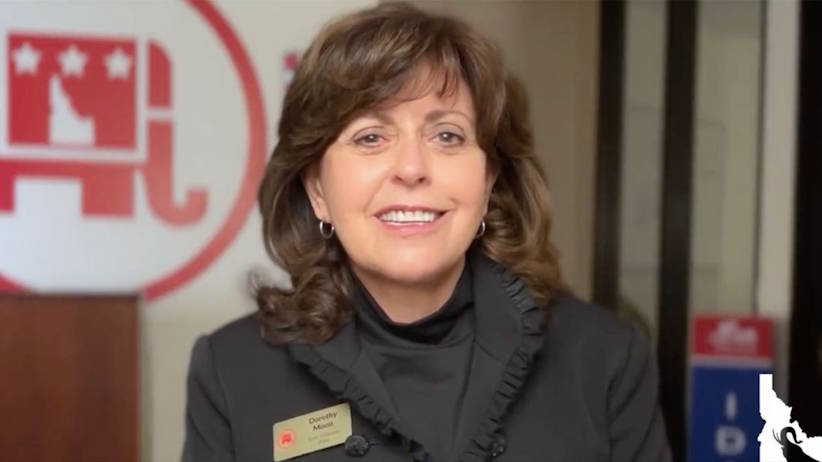
Dorothy Moon, Fiscal Conservative
By Brent Regan
The Idaho Republican Party has undergone a fiscal conservativism transformation, but some political establishment cronies are so habituated to spending that when presented with fiscal conservatism facts they refuse or are unable to understand. It is outside their world experience, as if you were trying to discuss fire with a fish.
What is a “fiscal conservative?” Some say it means someone doesn’t like to spend money and if in a political office they should be against spending, period. But government does have functions that we the taxpayers require, so simply not funding those functions is not a practical option.
Fiscal conservatives believe in working efficiently. They don’t believe that spending is intrinsically bad, they believe that wasteful spending is intrinsically bad. They believe in innovation and finding new and more practical ways to accomplishing tasks.
Republican State Party Chairman Dorothy Moon’s parents survived the Great Depression and the Second World War. Efficiency was a necessary part of life growing up and those early lessons run deep. Even today, she lives off-grid in a log cabin she and her husband Darr built themselves. When the mailbox is miles away, electricity is solar, water comes from an artesian spring and your hot tub is wood-fired you develop habits that aren’t wasteful and a can-do attitude that is infectious.
After Madam Chairman Moon’s landslide election in July, 2022 she inherited a pile of bills, a disorganized office, and litigation her predecessor had filed against our own party. She immediately went to work. Within 8 months she was presented with a major challenge.
The Idaho Legislature passed, and the Governor signed the Secretary of State’s bill that “accidentally” deleted the Republican Presidential Primary leaving Idaho Republicans completely disenfranchised from the Presidential Primary. Moon called an emergency meeting of the Republican Executive Committee to formulate options to present to the Republican State Central Committee in the upcoming summer meeting. The options ranged from paying the state over $2.7 million to conduct a primary, to having the state’s 974 Precinct Committeemen vote for who would be the Republican nominee.
The 220 members of the State Central Committee decided that a Caucus would be the best way to re-enfranchise Idaho’s 600,000 Republican affiliated voters. This proved to be a massive undertaking as the last caucus had been in 2012 and there were no records of how that caucus was conducted. It all had to be reinvented from scratch.
Dorothy assembled a dedicated team and went to work developing rules, procedures, instructions and planning the logistics to support all 976 precincts that would caucus simultaneously at 221 unique locations across the state. Poll books for every precinct listing every voter need to be created. Secure ballots needed to be designed and printed. Postcards informing voters when and where they would caucus needed to be sent to every Republican. Even hand stamps needed to be designed and procured, and much, much more. This was a huge and potentially very expensive undertaking that had never been done at this scale before.
Often it is the little things that add up to success or failure. Early on, Madam Chairman Moon decided to charge candidates $50,000 to be placed on the caucus ballots. Six prospective nominees paid the fee before the deadline. Dorothy herself and a handful of volunteers crisscrossed the state logging tens of thousands of miles to give caucus training to every county central committee. The decision to send a postcard to every Republican household with one or more Republican resident instead of every individual Republican saved over thirty thousand dollars.
Despite the couch critic naysayers and the worst snowstorm in a decade, the caucus was a huge success. Every qualified Republican who wanted to participate could participate and every precinct had successfully reported their results by 8:00 pm that night.
Not only did the Republican Party save Idaho taxpayers over $2.7 million, but because of the candidate fees and excellent cost management the party distributed nearly $75,000 back to the counties to help offset their costs.
The May primary election held the next major challenge, an “Empire Strikes Back” attempted statewide hostile takeover of the Precinct Committeeman positions by the establishment cronies with their lobbyist and Democrat allies. The grassroots “Rebel Alliance” held off the takeover but the attack organizers remain to this day as anonymous trolls pedaling lies against the Republican Party and our chairman.
The next threat was Prop 1, Ranked Choice Voting, which would have destroyed the Republican Party and turned Idaho blue. Dorothy marshaled resources across the state and wisely spent over $125,000 on our No on Prop 1 campaign. Even though the opposition spent over 20 times that amount, Prop 1 was defeated in a landslide. Every Republican elected official benefited from this win.
The Republican National Convention is another example of fiscal conservativism. Each of Idaho’s delegates, alternates and guests contributed $500 to offset costs. Not only were all costs covered, the party had $10,000 left over. 2024 was a very busy year.
The prior chairman spent over $50,000 for a weekly, half hour radio spot. Madam Chair Moon gets an hour of airtime at a major Idaho radio station free every week.
Dorothy travels to many of the county “Lincoln Day” fundraising events, but she doesn’t go empty handed. She brings precious metal coins minted and donated by Idaho’s Money Metals to auction. All the proceeds, typically thousands of dollars, are given directly to the host county.
The grassroots Republican voters appreciate Dorothy Moon and we know this because donations to the Idaho GOP are up over 20% and the number of donations is up 35%.
Establishment cronies and their lobbyist friends are not happy with the grassroots Republican Party, but that’s okay. Thanks to Madam Chairman Moon’s leadership we are doing just fine without them.
Fiscal conservatism is good policy.
It’s just common sense.